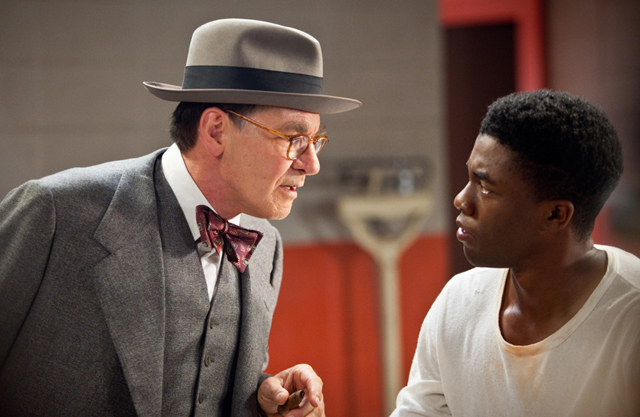CHICAGO – Excelsior! Comic book legend Stan Lee’s famous exclamation puts a fine point on the third and final play of Mark Pracht’s FOUR COLOR TRILOGY, “The House of Ideas,” presented by and staged at City Lit Theater in Chicago’s Edgewater neighborhood. For tickets/details, click HOUSE OF IDEAS.
‘42’ Celebrates Jackie Robinson, the Promise of America
 Rating: 4.5/5.0 |
CHICAGO – It took baseball, that noble sport, to recognize in 1947 what the universe had dictated since day one – all persons are equal and all deserve an equal chance. Jackie Robinson was the first African-American to break the “color line” in baseball, and the story of that achievement is magnificently told in “42.”
The story is more honest than previous efforts, in the sense that movie conventions can now historically show the virulent racism of that time, with casual exclamations of the “n-word” by the ignorant people that opposed Robinson. It also delves into motivations, which include the profits that Branch Rickey – the Brooklyn Dodger executive that found Robinson and put him on his team – anticipates from the move. The story is of the process of getting Robinson to the Dodgers, including the promise from the ballplayer to “turn the other cheek” when it came to his detractors. It is a story of courage, both on the side of Jackie and Rachel (his wife), plus the efforts of the African American media at the time, early civil rights advocates and American citizens of all stripes that knew segregation was wrong. The film also lovingly recreates the baseball of the era, including the legendary Ebbets Field of the Brooklyn Dodgers, a modest neighborhood diamond where history was made.
Baseball executive Branch Rickey (Harrison Ford) desires that his team, the Brooklyn Dodgers, be the first to integrate the major leagues with an African American player. Even 84 years after the Emancipation Proclamation, assimilation into general American society has been difficult for blacks, because of segregation laws.Two years after World War II, in which African Americans served nobly, Rickey recognizes the need to break professional baseball’s color line. He also realizes the profit potential, with a whole new audience for his team.
 Photo credit: Warner Bros. |
After extensive research, Rickey finds a stellar athlete – Jackie Roosevelt Robinson (Chadwick Bozeman) – who is a 26-year old playing ball in the segregated Negro Leagues. Rickey recruits Robinson to play with the Dodgers minor league club, the Montreal Royals, and his exceptional season there gets him invited to spring training in 1947. Robinson makes the starting team, and Rickey signs him to the Dodgers, only after warning the ballplayer that he cannot react angrily to the inevitable backlash. When Jackie Robinson took the field on April 15th of that year, baseball – and the American culture surrounding it – went through a profound and long overdue change.
By focusing on that one year of the integration, the film is able to episodically tell the story of Robinson and America. Writer and director Brian Helgeland (“A Knight’s Tale”) strikes a nice balance between Robinson’s journey and the baseball elements around it. The overall narrative is a bit romantic – why wouldn’t it be, given what is accomplished? – but mostly it exposes the story unflinchingly and honestly. Helgeland’s script wasn’t afraid to show the catcalls from the bench of the other teams, including an unending stream of the n-word by the Philadephia Phillies manager Ben Chapman (unerringly portrayed by Alan Tudyk). That emphasized the challenge of Robinson’s achievement better than any history book could do.
Another balance was highlighted in Robinson’s support system. His wife Rachel (Nicole Beharie) is given equal time in the struggle, including an incident in which she experiences a segregated restroom in the American South for the first time. His teammates are portrayed as split on the issue, but the individuals who step up and accept him, like Dodgers shortstop Pee Wee Reese (Lucas Black), become part of the white Americans who knew that segregation was finished.
And what about Harrison Ford? He seems to relish every moment portraying the legendary Branch Rickey, and creates a characterization that is miles away from his usual image, in a good way. He becomes like a moralizing angel, appearing before Robinson during the most challenging points that season. Chadwick Boseman is a revelation as Jackie himself, not only replicating the look of the man, but also his fervent athleticism. Robinson’s style of play, displaying the speedy base running common in the Negro Leagues, was an evolving part of his whole contribution, and Boseman displays it perfectly.
 Photo credit: Warner Bros. |
Also nicely represented is the African American media, through the aid and support of Robinson shown in the film by Wendell Smith (Andre Holland). That portion of the media – led by Smith – was relentless in its call for baseball integration, and Smith also broke the color line in the press box. Symbolically, as he becomes Robinson’s mentor and friend, his chronicle becomes a significant force in the film. The story as presented proves it takes a village to create change, and every side of that village is vividly and deservedly brought to light.
President Barack Obama, in his victory in 2008, expressed that if anyone doubted that America was a place where all things are possible, his election was the answer. Jackie Robinson was a pioneer in those possibilities, and “42” is his story, the promise of this nation.
 | By PATRICK McDONALD |


